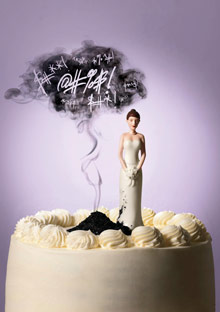With This Rage, I Thee Wed

Illustration: Reena de la Rosa
When is a marriage troubled, and when is it fatally flawed? One woman looks back on her husband's temper—and their journey to a more perfect union.
I was sitting at the wine bar with a friend—I'll call her Lacey—who was considering divorcing her second husband, having recently discovered his stash of hard-core porn. "I know that no man's a saint," she said, "but I can't live with lechery.""That takes care of lust," I thought, and made a mental note. Although I hadn't told Lacey, I had a little project going—involving a question I'd been challenging other friends to answer: Given that no person and no marriage is perfect, if you could pick your mate's flaw—the one flaw you could live with—what would it be? Nothing so slight as socks on the floor or a residual jones for Pac-Man. I meant the things we keep hidden from even our closest confidants, the things that can prove fatal to a marriage: lust, gluttony, greed, sloth, envy, wrath, and pride. So far, none of my friends had been able to pick a "best" flaw; all they'd managed to do was rule out the worst.
"I'd rather die," willowy Meg had said, "than be married to a glutton."
Greed? "Cross it off," Theresa snapped, then hesitated when I suggested pride. "Pride is why my husband left me," she said. "I could never admit I was wrong."
Now, at the wine bar, Lacey sipped and sighed. "I want a husband like yours," she told me. "Someone who reads me love poems over breakfast."
I just smiled. After 26 years, Bob and I do still spend summer days as we did the July we got married: camping along Northwest rivers, fly-fishing, drinking Champagne. The demands of our professional lives (both of us are writers and teachers), the rigors of child rearing, the empty nest we are fluffing, cross-country moves, money woes—the pressures that so often destroy a marriage, ours has survived. To Lacey, it seemed a storybook romance. What she didn't know was how close I had come to leaving the marriage she idealized. I'd never told her the flaw I'd chosen—that Bob was a wrathful man.
When I met Bob, I was 22. He was seven years older, seven inches taller, and I was enthralled by his intellect, his passion, his hair (oh, his hair! dark, thick like an animal's fur, hanging down in his eyes, curling at his collar…). He'd sung in a rock band, been a conscientious objector during Vietnam, and was now a talented poet and teacher. I watched him weep over the death of John Lennon and rail against wrong-minded politicians. And soon after we moved in together, I got my first glimpse of his rage.
The lawn sprinkler that failed to oscillate? Bob beat it into the ground, gaskets flying. The chain saw that wouldn't run, he pitched against a tree until it snapped into pieces. I laughed when I recounted these slapstick incidents to friends. Who was he hurting, after all?
I was 25 when Bob asked me to marry him. Moderate in his consumption, balanced in his ambition, kind to my parents, and lustful only for me: If an occasional temper tantrum was his only flaw, I should count myself lucky.
But one afternoon the summer we married, Bob and I were driving back from the store when we found ourselves behind an elderly woman at a traffic light. She hesitated, not sure if she wanted to turn left or right. Bob grimly rode her bumper. "Get off the road, you old bag!" As we roared by, he flipped her off; on her face was a mix of befuddlement and fear.
I sat stunned. Outraged.Speechless. Silently fuming.



